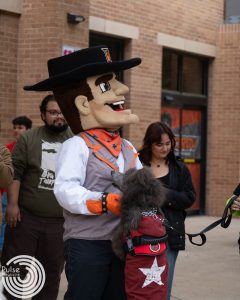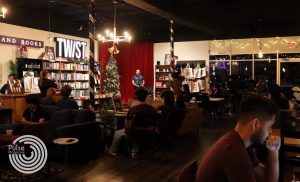The Myth of the Disappearing Tribal Communities: Commemorating Indigenous Peoples’ Day
Photo Courtesy: Alexfaith Larios
Today, the second Monday of October, is a dual holiday in Texas, recognizing Columbus Day and Indigenous Peoples’ Day. The ongoing and controversial debate of valuing both commemorations of American history has caused split views of what this day truly signifies.
Salvador Salinas, senior history lecturer, said we need to take into account Indigenous peoples’ experiences in the conquest. There is no way you could celebrate Columbus Day and tell the story of the conquest of the Americas without looking at it from Native American perspectives as well.
According to Salinas, the significance of Columbus Day comes from Italian immigrants in the late 19th century, as they were assimilating into American society.
“[Italian immigrants] suffered discrimination because they were Catholics and they were from Southern Europe,” Salinas said. “They saw celebrating [Christopher Columbus] as a way to integrate into American society and something to be proud of, being an Italian in the past.”
Despite Columbus Day representing integration for Italian immigrants, Native American communities do not view Columbus as an individual to be ‘celebrated.’ The arrival of Columbus in the Americas would lead to the decimation of Native American populations through violence and a cultural collapse. Indigenous Peoples’ Day must be assimilated in order to commemorate their role and their suffering in American history.
According to Salinas, Indigenous people have been at the forefront of civil rights protests and many environmental struggles since the late 19th century. Native Americans were seen as an ‘obstacle’ for the new American life. American settlers thought civilizing out West was a good thing, and if the price to pay was the annihilation of the Native Americans, so be it.
“I had a professor who said: ‘It is only after we annihilated the Native Americans that we can begin to celebrate and appreciate them.’,” Salinas said. “So, I think it’s kind of crude but there is truth to that.”
Native Americans’ stories have been systematically erased from Texan history, causing the myth that Tribal people are long gone from our state. Salinas said this belief goes back to the colonial days where Native Americans were disappearing.
“… However, much of Native American culture still endures today. So, it is a myth that the Native Americans completely went extinct because they are still with us today. We can even see it in our classroom. We have an Indigenous person who is very in tune with their Native American identity,” Salinas said.
That Indigenous person is Alexfaith Larios, a biology and history junior, who is an active member of the Lipan Apache Tribe of Texas. Larios shared her story with Pulse to showcase the efforts made in her community to commemorate Indigenous Peoples’ Day in Texas and to prove the myth wrong. Indigenous people do remain and they deserve to be seen.
Tell me about yourself, your upbringing, and how you discovered your cultural roots?
“I am Ndé (nn-deh), which translates to “the people”, otherwise known as Lipan Apache. I grew up knowing I was Apache and my grandpa was always proud to tell my mother and I this growing up. Due to assimilated practices, such as religion, I couldn’t fully immerse myself in my culture. However, when I left the church, I was able to free myself from colonial cuffs and get connected with the Lipan Apache Tribe of Texas, which allowed me to reconnect to my culture. Tribal members were nothing but welcoming and helpful. I even remember my cousin, Leroy Peña, telling me at one point ‘welcome home’. I’ll never forget that. I am an enrolled member of the Lipan Apache Tribe of Texas.”
What is the significance of Indigenous Peoples’ Day within your experience as a member of the Lipan Apache Tribe of Texas?
“Columbus arriving to the islands and meeting with the indigenous tribes there, such as the Tainos, to commit horrific genocide, torture, and slaughter has been long glorified as an accomplishment. Columbus day is a scarring reminder that the erasure and genocide of Indigenous people is completely overlooked and acceptable in colonial society. My experience with Indigenous Peoples’ Day has been quite the journey. I was with my cousin, Leroy Peña, from the Red Hand Warrior Society, along with Brown Berets and other Lipan Apache tribal members, the day Tarrant county granted the proclamation for Indigenous Peoples’ Day. Soon after, Leroy, and other amazing organizations and activists, took this matter to Governor Greg Abbot, where he eventually signed Indigenous Peoples’ Day into the state of Texas. By introducing Indigenous Peoples’ Day on Columbus Day, I got to see a positive lens placed on not only history, but Indigenous people in the state of Texas. For hundreds of years, Indigenous people have been invisible on our own land. Having Indigenous Peoples’ Day is a step forward towards visibility for us.”
What is the story of the Lipan Apache Tribe of Texas? How did this group come to be and how do they honor Lipan Apache heritage?
“The Lipan Apache Tribe has been on this continent for thousands of years. We moved into the San Antonio area, which we called “many houses”, from the Great Plains in the early 1600s. Our traditional lands extend from Oklahoma to Northern Mexico. We have several bands within the tribe that come from different parts of this territory as well. During colonization, there was a continuous genocide perpetuated on our tribe along with broken treaties. Due to the colonial violence, we did not get the option of being established as a federally recognized tribe. In fact, some of our Lipan relatives were relocated forcefully to the Mescalero Reservation. Some stayed in Texas trying to blend in with society and others fled into Northern Mexico for safety. Our language is nearly extinct now. However, our culture survived and is practiced today via ceremonies and other traditional teachings. We are also now a state recognized tribe and we have a hope of one day becoming a federally recognized tribe. The Lipan Apache Tribe of Texas is a true example of resilience, just as Indigenous people across the globe are still fighting for their right to exist in 2023.”
What efforts have been done in your community to reclaim your pre-colonial roots?
“Of course, we have others, like me, who are “coming home”. Once lineage and proof of Lipan identity is shown, they can reconnect to their culture by being involved in our community and learning. Decolonizing is a huge and long process that we encourage. However, our culture and traditional teachings are scary, and there are members willing to teach our relatives who want to learn more about what was stolen from them due to colonization.”
How do the Lipan Apaches manage the lack of reservations, representation and recognition from the federal government?
“We have always been here, and contrary to the common belief of Natives no longer existing, we are still here. My tribe has a council member, Gonzo Flores, who is the Vice President of the NCAI, The National Congress of American Indians, and Southern Plains members, like my cousin, Leroy Peña, that do activist work in the state of Texas, such as the recognition of Indigenous Peoples’ Day. [My tribe] also has members who strive to protect the environment in Texas. Buffalo has also been introduced to Texas by a Lipan Apache woman named Lucille Contreras, which is a huge accomplishment. This is how we stay visible while working towards federal recognition.”
Is there anything else you would like to add?
“Stop celebrating Columbus Day. Stop glorifying the death of our people. Listen to Indigenous voices, especially when regarding the environment. With all of us living so close to Mexico in the Rio Grande Valley, remember that Indigenous people were also in Mexico. They are alive in Mexico as well as resilient. If you discover you have Native ancestry and would like to reconnect to your pre-colonial roots, I highly encourage that. I know Indigenous Peoples’ Day also has had this effect on people, which is not a bad thing, but as an Indigenous person, I ask that, should you take on the journey to reconnect, please do it respectfully. Do the work to find what tribe you come from before appropriating another tribe. Not everyone will be able to find their tribe, due to the severe effects of colonization, however, that does not mean that they cannot be part of the community as an ally and uplift Indigenous voices, especially on days like Indigenous Peoples’ Day. If you are not Indigenous at all, but want to support Indigenous people, look up our movements, such as Missing and Murdered Indigenous Women (#MMIW), Land Back, and Every Child Matters (#ECM), and help spread awareness. Remember, we are still here.”
Today is an opportunity to honor the attributions and experiences of Native Americans that have shaped the United States. As Larios said, Indigenous Peoples’ Day is a chance for everyone to connect with their pre-colonial roots, explore their ancestry, commemorate those generations before us and support movements that protect the present and future of Indigenous people.





